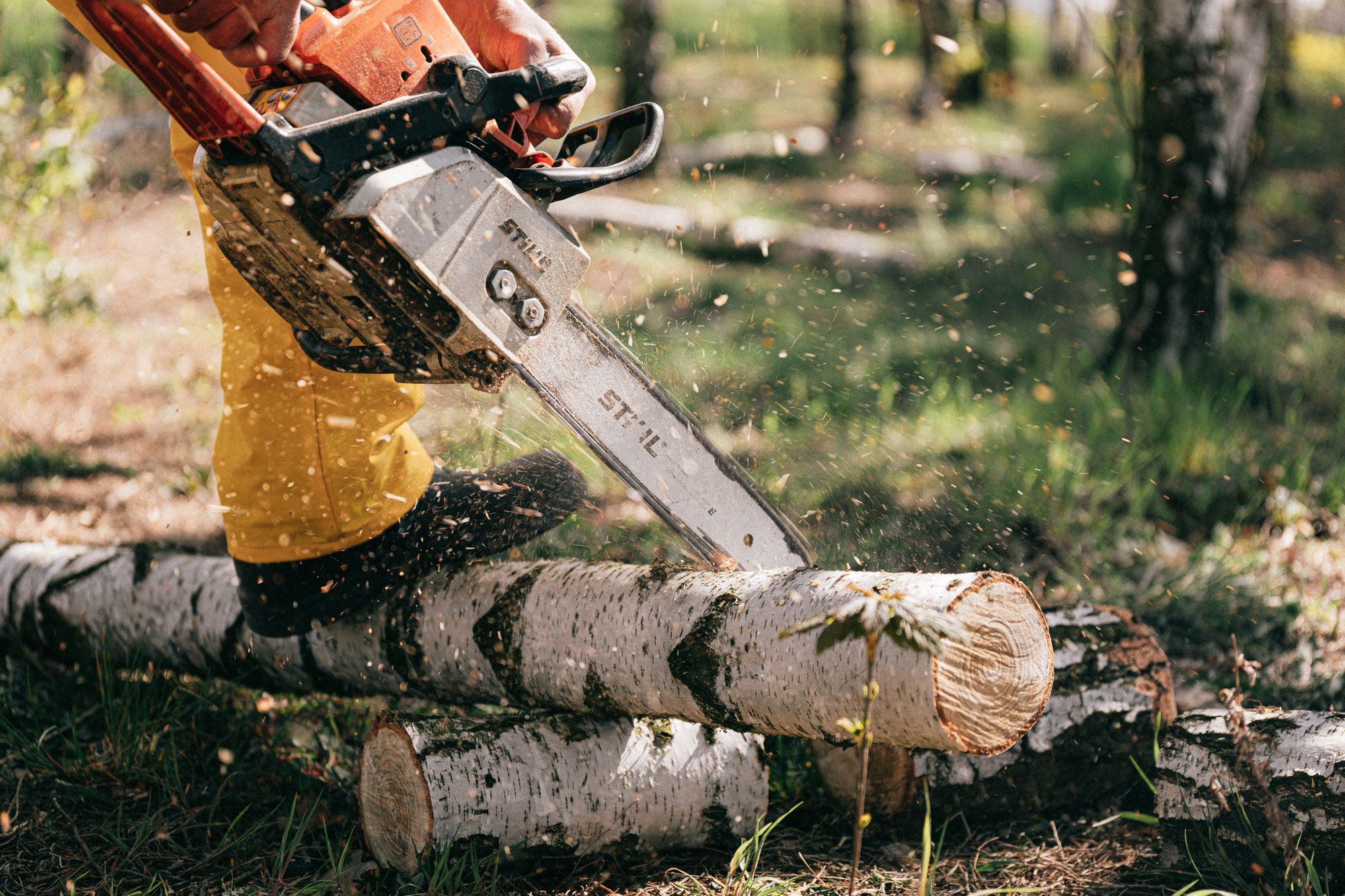One of the most dependable gas-powered tools the average householder can buy and use untrained is the chainsaw. This is accurate, at least most of the time. Lubricating our chainsaws is more complicated than just starting the engine and operating the chainsaw. Using the incorrect oil over time might harm or even ruin your chainsaws.
Chainsaws have a top speed of around 50 mph. When traveling at that speed, you must periodically top up your oil. But what should you do if the oil your manufacturer recommends runs out? This post will answer that query and review each alternative to chainsaw bar oil you will likely have in your house.
So let's start the post and find the finest chainsaw bar oil alternatives!
Understanding Oil's Properties
The numbered system used to describe the attributes of the oil will be recognizable to you if you've ever bought or used it. On the labels of many oil products, you will often encounter 10w30 or another version of the oil viscosity numbers system.
Viscosity, which varies with oil temperature, may be considered the thickness or ease with which an oil flows. The density of the oil increases as the temperature rises or it becomes runnier.
The first number on the 10w30 oil label reflects the oil's viscosity at room temperature or cold weather; the word W stands for these conditions. When the engine operates, the fat typically reaches a temperature of 100°C (212°F), represented by the second number, 10w30. Thus, the viscosity is SAE10 in a cold state and increases to SAE30 in an engine under operating circumstances. An industry-recognized grading scheme is SAE.
We now know that gear oil will be significantly thinner at room temperature and 100°C if we compare two oil kinds, 5w30 engine oil, and 85w140 gear oil. This will impact the oil's capacity to adhere to a surface and provide adequate lubrication.
What kind of oil is suitable for chainsaw bar oil?
Verify the manufacturer's instructions before putting alternative bar oil on your chainsaw. In general, chainsaws may work with various lubricants, but SEA30 is the best option. Following the SAE ratings and using the correct oil weight for the season, vegetable and canola oils and automotive motor oil perform nicely. Avoid recycling spent oil and always use fresh oils.
Even though most oils may seem identical to the unaided eye, you don't want to use the wrong oil to fill the reservoir. Chainsaws are as susceptible to bar oil as are vehicles and other big engine machinery, but this regulation only applies to them.
Bar oil specifically affects how well the chainsaw works. The oil must be slick and thin enough to allow the chain to pass easily through the wood pulp and chips. A 5–10 SAE rating should be sufficient. Second, the oil should be sufficiently sticky at high speeds to adhere to the chain and bar. The optimal SAE rating is 30. It follows that a multi-weight oil is a clear winner.
1. 10w30 Motor Oil
A 10w30 oil can be used without any significant problems. In actuality, most bar oils are pure 20w or 30w.
Multi-weight motor oil will provide adequate lubrication performance in all but the worst weather conditions. It could be too thin in the sweltering summer and too thick in the cold winter. You could notice a decrease in chain speed or oil too thin to cling to and lubricate your chain under these conditions. But this is the same as bar oil, where you may choose a 20w or even 40w.
When the chainsaw is started, 10w30 motor oil behaves like SAE10 oil, and at room temperature, it will be thin enough to lubricate the chain and get it moving. A 10w may congeal and thicken under cold weather conditions.
Since 10w30 is one of the most widely used and adaptable oils in the world, and since ordinary weather conditions make it a decent substitute for bar oil, chances are strong that you already have some in your garage if you move on and begin utilizing it.
- Useful in warmer climates
- Most people will have this trendy oil on their garage shelves.
Hazard: Depending on the location of your job, you should be aware that motor oils are manufactured goods and may harm the local fauna. So, if you're working in your yard or anything similar, I'd advise against using motor oils and instead choose one of the natural items recommended below, such as cooking oil.
2. 5w30 Motor Oil
You may use 5w30 oil, just as 10w30 motor oil. However, the low-viscosity SAE5 weight oil's thin consistency will also not adhere to the chain in the heat. If you use this oil substitute, you can notice significant oil loss and a dirty job site.
If you don't have any other oil, affordability is one benefit of using engine oil like 5w30. Automobile oil is reasonably priced; quarts usually cost at most $10. Just bear in mind that when motor oil spills off the chain, it is not ecologically friendly.
- 5W oil with low viscosity that yet works in more excellent areas
- Expect more of this oil in the summer since it sprays off the chain.
Online discussions on the use of motor oil in chainsaws have lasted for years and include both forestry professionals and novice chainsaw fans. Although the verdict is out, experts concur that 5w30 motor oil is a suitable substitute. It just isn't a long-term fix.
3. Vegetable Oil
Yes. One of the most outstanding oils to utilize as a replacement is vegetable oil. Many professionals extensively use this oil as their go-to chainsaw bar oil since it has no environmental contamination risk, emits nearly no fumes, and is non-toxic. Stihl, the business that created the chainsaw in 1926, bases its BioPlus Bar Oil on vegetable oil.
- Eco-friendly, utilized as the foundation for Stilhs BioPlus usage.
- runs without emitting any unpleasant odors
- Ideal viscosity may be found in canola, soybean, and olive oil.
Vegetable oils come in various varieties (including canola oil, which is covered below). Bar oil may be substituted with success with soy oil, olive oil, and rapeseed oil. They function effectively in warm weather and have excellent viscosity. Sunflower oil should only be used in more relaxed areas since it is thinner.
4. Canola Oil
Since this post is about substitutes for bar oil, you should probably use whatever oils you already have at home. Canola oil has advantages and disadvantages, but if I had to recommend one alternative crude, it would be canola. Canola oil is preferred over bar oil by arborists all over the globe. It is inexpensive, biodegradable, and hardly scented. However, since canola oil is relatively thin and does not adhere to the chain and other possibilities, you must replace your bar more often.
On the other hand, canola oil costs about half as much as the oil that most manufacturers advise using. Therefore, because canola is so inexpensive, utilizing more of it is not a financial hardship.
- Natural and ecologically beneficial is canola oil.
- Very affordable and most often found at kitchen supply shops
- It may go rancid since it's natural and can do so if it's not utilized for a while.
However, canola oil is eco-friendly, keeps the chainsaw bar adequately lubricated, and is simple to remove from clothing. Canola oil has one drawback, so use it before expiration.
5. 2-Cycle Oil
No, 2-cycle oil is not a suitable replacement since it is far too thin to lubricate the bar. It lacks the viscosity needed to adhere to the chain and serve as bar oil. 2-cycle is intended to be used in 2-cycle engines after being combined with gasoline. This oil is thus fragile by design, allowing it to mix with the gas. A heavier oil wouldn't mix with the gasoline; instead, it would clump or pool.
- Never substitute bar oil with two-cycle oil; only use it as an engine oil mixture.
- Two-cycle oil won't have sufficient tact to adhere to the chainsaw chain.
6. Gear Oil
Gear oil is only a suggested substitute if you operate your chainsaw in hot weather. Why? Most gear oil is thicker than suitable chainsaw lube and at least three times dense than conventional motor oil. Gear oil will undoubtedly get your chainsaw going, but if you use it for a lengthy period, you'll probably lose your manufacturer's guarantee.
- Gear oil with a high viscosity could be a better substitute that might cause performance issues.
- Very high cost in comparison to other options
The expense of gear oil is another deterrent. It's not a wise financial move to purchase gear oil as a backup unless you have a supply on hand in case your chainsaw oil runs out. Instead, choose SAE10/30 motor oil or plain canola oil, which are both ecologically friendly.
7. Hydraulic Oil
You may use hydraulic oil for chainsaw bars even though it dries faster than motor oil. Because it has many characteristics with motor oil, this kind of oil will keep your chain and bar lubricated within the proper temperature range.
However, avoid using recycled hydraulic fluid; some individuals try to filter old fluids that have been emptied from cars. How tight can you get? This is too much labor to me. Hydraulic fluid drained into the environment harms the ecosystem and might damage your chain.
- Useful in a wide range of temperatures
- Keep an eye on your oil levels since this is a thinner oil, and you will use it quickly.
However, new hydraulic oil is acceptable. Because it is relatively thin and dries out faster than engine oil, be mindful of overheating and refilling it often during the hour.
What Chainsaw Bar Oil Is Best?
The ideal oil for adhesion and lubrication is a plain 20w or 30w oil. Since BioPlus from Stihl provides an environmentally friendly solution that will function in all the weather situations I operate in, I prefer to use it.
An excellent substitute that you may have lying around in your garage is 5w30 engine oil. Vegetable oils, such as canola, olive, or rapeseed oils, are another widely used choice with all the properties needed for bar oil. Simply take care not to leave them out for too long, as they may become rancid if left out for too long.
Last Thoughts on Bar Oil Substitute
Substitute Oil and Alternative Oil
Although chainsaws are made to be tough, durable equipment, oil is essential since chainsaws are sensitive to insufficient lubrication. The manufacturer advises using a particular oil, which is often brand-specific since it enhances the performance of your saw. A replacement is a compromise, but choosing the correct oil will fulfill its function until you can get raw bar oil.
For most chainsaws, vegetable oils like canola, sunflower, and olive oil are the ideal substitutes. Avoid SAE90 or higher oils with high viscosities and extensive processing.
Understanding the right chainsaw bar oil substitutes can dramatically enhance the lifespan and performance of your chainsaw. Bar and chain oil are specially designed to stick to the chain and bar, reducing friction and prolonging your tool's life. However, in emergencies or when access to standard chain oils is limited, alternative oils like soybean oil or drained motor oil can serve as a viable chain oil substitute.
It's crucial to remember that while these substitute oils are not perfect matches for specialized bar and chain oil, they can temporarily fill the oil reservoir and keep your chainsaw running. That said, used motor oil, although sometimes considered an option, should be approached with caution due to its potential environmental impact. The same goes for transmission fluid, which can also serve as a chainsaw bar oil alternative in a pinch.
Remember, when using substitute oils like soybean oil, be aware that these alternatives may not offer the same level of protection as standard bar and chain oil. Continually monitoring the condition of your chainsaw will help determine how well the chain oil substitutes are performing. Ultimately, the right chainsaw bar oil substitute will allow your tool to operate efficiently while extending its lifespan, thereby providing greater value for your investment.






